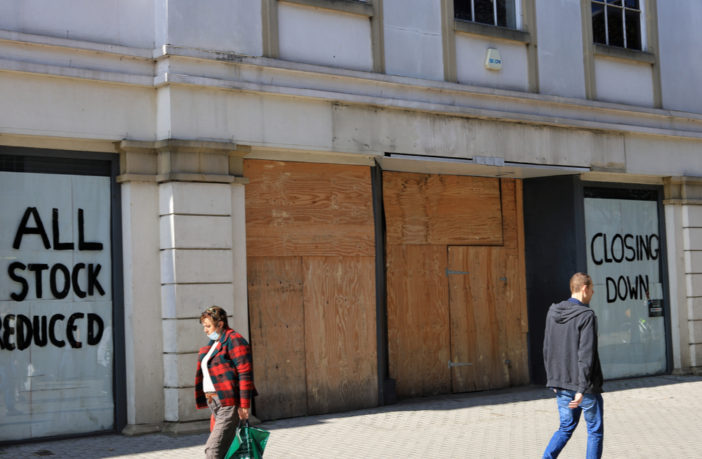As figures released this week by the Office for National Statistics reveal that the under 35s are likely to be disproportionately affected by job cuts as a result of the pandemic, the OU’s senior lecturer in economics Alan Shipman examines the picture behind the figures. Reflecting on earlier crises that have hit youth employment he considers how, post-Covid, young people already living in tougher economic times, will need to adapt to a changing jobs market and recruitment arena.

Lecturer in Economics, Alan Shipman
“While Covid-19 has taken its heaviest toll on older people, younger people will suffer the longest-lasting effects.
A combination of once-in-a lifetime crises – the global financial crash (GFC) of 2008 and the global pandemic of 2020-21 – means those now aged 18-35 have seen the world around them fall apart at decisive moments in their lives. The consequences could be lifelong, without a sharp shift of policies currently focused higher up the age-range.
Fewer jobs and hesitant employers
The UK’s furlough scheme has kept overall unemployment remarkably low – just 4.9% in February by helping people keep their jobs even when the work can’t be done. But it means those posts won’t need to be advertised again when the economy re-opens. As it was still over 8% smaller at the end of 2020 than before the pandemic, few new jobs are being created alongside them.
Even when vacancies are available, many employers are hesitant to hire someone new when they can’t go through a test centre or be interviewed face-to-face.
There have been widespread freezes on recruitment, even in areas – such as higher education – not expecting any job losses.
So the past year’s recruitment has been tilted towards people who already have experience, and are switching from a similar job rather than seeking one for the first time.
For those still in school or full-time at university, there’s been the additional disadvantage of lessons and tests being hastily redesigned for delivery online. Where social disadvantage is greatest, school closures have meant missed lessons due to broken internet connections and other distractions at home. One consequence, missed meals, was quickly tackled when a prominent recent beneficiary highlighted its impact.
But the government’s ‘catch-up tsar’ and his task-force are still looking for solutions to the bigger challenge – how to restore the lost learning opportunities so that tomorrow’s school-leavers get a fair chance of the university or training place that’s now essential for a career.
The return of youth unemployment
Covid job losses have been concentrated in the UK on people aged 16-24. These multiple shocks to the Classes of 2020-21 mean that most of the 800,000 due to leave education this year will struggle to find work , sharply raising youth unemployment that was already above the adult average, despite being at a 20-year low in 2019. Independent forecasts now show youth unemployment reaching levels not experienced since the early 1980s, which left many permanently disadvantaged from being dropped at the start.
The pandemic blow to education and job prospects has landed on a young generation already facing serious economic and social changes.
For Millennials, whose entry into work was disrupted by the GFC in 2008, Covid-19 is a second setback at a key career moment in terms of earnings and promotions. Many were already resigned to being Generation Rent because of the high cost of housing , and the tightening of mortgage lending rules after the GFC. Even when most younger people were in work, their average real wage barely risen since that crisis, while state pensioners have been guaranteed an increase by the “triple lock”.
What’s to be done – differently?
The last big rise in youth unemployment was tackled with a government-sponsored push for additional education and training, for those not in a job that already provided these. Economic policies of the time, shaped by Margaret Thatcher in the UK and Ronald Reagan in the US, were focused on improving the “supply side”. The aim was to create jobs through wage flexibility and the incentives unleashed by cutting taxes on income and business.
But when the problem receded, it was mainly due to these governments injecting more demand into the economy by spending more and lowering interest rates, while the number of new young workers declined because of falling family size. “Youth Training” was often criticised for providing temporary low-wage jobs to employers who didn’t offer much training, and didn’t have to keep the trainee at the end of the course. There was even a backlash against “YT conscription” when the government threatened to withhold social benefits from young people without a job who refused a training place.
When youth unemployment flared in the early 1980s, and again in 2010 after the GFC, governments were determined to borrow less and balance their budgets, at a time when previously safe jobs in manufacturing and public services were rapidly disappearing. So many younger people squeezed in to lower-paid and less secure work, to avoid becoming long-term unemployed.

The hospitality sector has been particularly hit by the pandemic.
Today’s response is very different, with even Conservative governments willing to continue borrowing heavily to keep jobs open until private companies can re-open and pick up the wage bill. Job-market experts advise against trying to create more entry-level jobs by reducing minimum wages or curbing immigration, since these can slow job creation by damaging business and productivity growth.
But if the government is to meet its targets for reducing debt and deficits from record peacetime levels, another budgetary squeeze – with deep cuts in public spending as well as tax rises – may be hard to avoid.
The stigma of losing a job, or not being able to find the one you’ve trained for, sometimes falls away when everyone in the year-group is affected.
Some who expected to struggle for work in the past year have found employers making allowance for the Covid disruption. But the prolonged, worldwide halt to normal business, leaving the economy stuck well below full capacity, will leave younger people competing more intensively for fewer, often less secure jobs even when normal recruitment resumes. Some recruiters who’ve grown to like the online hiring process aren’t keen to give it up.
So on top of all the other pressures, job-seekers must now prepare for an online interview that carefully replicates all the stresses and surprises of the face-to-face version.
The road ahead, for those who didn’t get a foothold in work before the pandemic, won’t be as hard as in the 1980s but looks a lot harder than when it was “only” the banks that had crashed.”
Careers Support from the OU:
The OU’s OpenLearn site has a suite of useful free careers and employability Badged Open Courses: Gain a badge and further your career – OpenLearn – Open University – including, for example, Developing career resilience.
Our careers service also hosts a series of podcasts about coping if you are made redundant with useful pointers Redundancy – your next steps.



